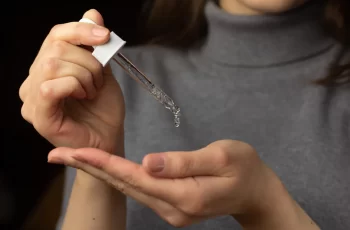
Can I use hyaluronic acid with retinol?
Would you like to hear the good news? You can certainly use hyaluronic acid with retinol, and you might be interested to know how many skincare experts consider this to be the best way to reap the benefits of both powerful ingredients.
The drying side effects that often occur when using retinol in your daily routine are often counteracted due to hyaluronic acid’s moisturizing properties. By using these two powerful ingredients together, you can combat signs of aging like fine lines and wrinkles, as well as skin damage caused by exposure to free radicals such as pollution, UVB/UVA rays, and central heating.
Now that you know a little more about using hyaluronic acid with retinol, let’s take a closer look at exactly what you can expect when you combine these impressive powerhouses together.
Which came first, hyaluronic acid or retinol?
This largely depends on the formulation of the products that contain each ingredient. Because to get the best results from your skincare routine, you need to apply the products in a formula that works from thinnest to thickest. For example, if your retinol is formulated in a moisturizer, you need to apply it after the hyaluronic acid (if it’s in a serum).
If you want my advice on the best way to use the product, I recommend applying retinol first and then hyaluronic acid. This ensures that the retinol can be absorbed into the lower layers of the skin, while the moisturizing properties of hyaluronic acid reduce its drying effects, providing moisture to the skin.
What shouldn’t be taken with hyaluronic acid?
The beauty of hyaluronic acid is that it can be used on almost all skin types and can be easily combined with other skincare ingredients. However, certain formulas, especially those known to be irritating to the skin, such as alcohol, fragrances, and high concentrations of powerful skincare ingredients, contain these ingredients, and you will want to ensure that the product infused with hyaluronic acid can fully function without this interference. For more information on hyaluronic acid, please refer to our dedicated blog post.
What products should not be mixed with retinol?
The key ingredients you should mix are vitamin C, benzoyl peroxide, and chemical exfoliants such as alpha hydroxy acid (AHA) and beta hydroxy acid (BHA).
Avoid mixing vitamin C and retinol, as these ingredients are more effective at different times of the day. For example, since vitamin C has powerful antioxidant effects, it’s best to use it in your morning routine to combat free radical exposure. Then, you can use retinol in your evening routine to repair and regenerate the skin while removing any damage that has already occurred to the skin.
AHAs and BHAs work on the outer surface of the skin, removing layers of dead skin cells and debris. Using retinol can over-irritate the skin, causing irritation, dryness, and discomfort. To prevent this from happening, I recommend using AHAs/BHAs in an exfoliating toner and using retinol in your routine after the skin has absorbed the acids and the pH has returned to balance.
When you use benzoyl peroxide with retinol, you’ll find that the two ingredients counteract each other. Therefore, it’s best not to alternate the days you use each ingredient.
If you want to learn more about retinol and its skincare benefits, check out Beauty Insiders for more information. Be sure to check it out.
Should retinol be used before or after moisturizer?
As I mentioned, this depends a lot on the formula of the retinol. However, there is nothing wrong with mixing retinol with a moisturizer, especially if it contains hydrating ingredients like hyaluronic acid. If you want to use them separately, it is best to apply a moisturizer after retinol. This ensures that moisture is locked in without interfering with the effective properties of retinol, which speeds up the renewal cycle of skin cells and keeps your complexion fresh, youthful and bouncy.
How long should you wait after retinol before applying a moisturizer?
Ideally, wait at least 20 minutes after using retinol before applying a moisturizer. This is considered the best time to ensure that the skin fully absorbs the active form of vitamin A and rebalances the skin’s natural pH. This is an important step to remember because skin irritation or allergic reactions are often caused by pH imbalances when products with different pH levels are layered too quickly.
In what order should hyaluronic acid be applied?
You will often find hyaluronic acid in skincare products that are used later in your daily routine, such as serums, moisturizers, and face oils. Using the thinnest to thickest skincare rule I mentioned earlier, this basically means using hyaluronic acid in the later stages of your daily routine. One tip I would give if you want to get the best results from HA products is to use a serum and then follow with a moisturizer, as the water in the formula helps to hydrate your complexion.
If you want to learn more about the best ways to apply hyaluronic acid, especially with active ingredients like retinol, don’t forget to check out this blog post.
There you will find more information on whether you can use hyaluronic acid with retinol. I hope I’ve answered some of your questions, but if you have more, follow us on Instagram.


